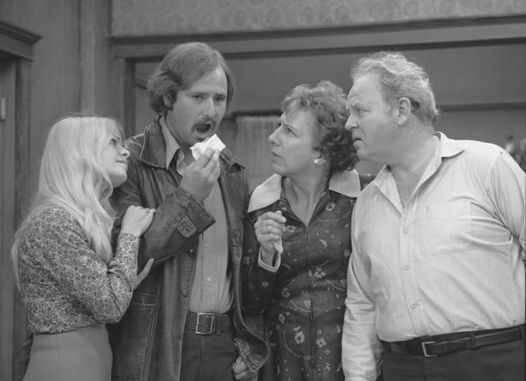
Fifty years ago, on Jan. 12, 1971, “All in the Family” premiered. Its warts-and-all look at real-life issues was a shock to controversy-averse television that sent reverberations through American culture.
The setting of the CBS series (available on getTV, iTunes), which ran from 1971 to 1979, was hardly revolutionary, the modest Queens home of the working-class Bunkers.
But TV legend Norman Lear, who served as executive producer with Bud Yorkin, broke the timid rules of television by injecting timely and controversial social issues, such as racial prejudice, sexism and Vietnam. (He also introduced a toilet flush – or “turlet,” as Archie pronounced it – to the TV sitcom.)
The series, which earned 22 Emmys and was TV’s top-rated show for five seasons, featured a memorable theme, “Those Were the Days,” whose lyrics channeled Archie’s longing – one still dreamed of by many today – for an imagined idyllic past.
A brilliant cast brought to life a vivid TV family: Archie (Carroll O’Connor), a bigoted man fearful of change but not without the possibility of redemption; Edith (Jean Stapleton), his seemingly simple but ultimately very wise wife; and Archie’s liberal foils, daughter Gloria (Sally Struthers) and son-in-law Mike (Rob Reiner), aka Meathead.
“Family,” inspired by British sitcom “Till Death Us Do Part,” also spawned TV’s greatest collection of spinoffs: “The Jeffersons,” “Maude” and “Good Times.”
And, after years of speculation about whether the “Family” and its take on cultural issues could air today, Lear and ABC late-night host Jimmy Kimmel proved it could in 2019 with a high-rated, Emmy-winning reproduction of an original script with an A-list cast.
“Family,” inspired by British sitcom “Till Death Us Do Part,” also spawned TV’s greatest collection of spinoffs: “The Jeffersons,” “Maude” and “Good Times.”

And, after years of speculation about whether the “Family” and its take on cultural issues could air today, Lear and ABC late-night host Jimmy Kimmel proved it could in 2019 with a high-rated, Emmy-winning reproduction of an original script with an A-list cast.Before the premiere, the cast and producers didn’t know how viewers would react. In that pre-digital age, extra operators were hired to handle angry phone calls, Struthers said in a 2009 interview.
Before the premiere, the cast and producers didn’t know how viewers would react. In that pre-digital age, extra operators were hired to handle angry phone calls, Struthers said in a 2009 interview.During the show’s run, “I would get mail by the tens of thousands. Whether they agreed with Archie or disagreed with Archie, what they all said was, ‘My father … my mother … my sister … my family … we argued about this, that and the other thing,’ ” Lear said in 2009. “I think conversation about those issues is what our democracy is all about.”
As other early ’70s shows shrank from sensitive subjects – including sexual orientation, rape, racism and cancer – “All in the Family” embraced them, O’Connor said in a 1991 interview.
Norman Lear was responsible for some of the most influential television series of the 1970s and ’80s, including “All in the Family,” “Maude,” “The Jeffersons,” “Good Times,” “Sanford and Son,” “Mary Hartman, Mary Hartman” and “One Day at a Time” (original and reboot).
“We would go after the most controversial topic of the day,” he said. “That was our stock in trade – to make trouble.”
